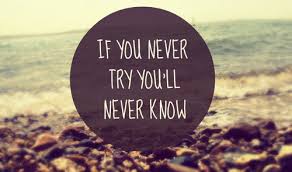Most new ventures are driven by either Necessity or Enrichment. We NEED to do things so we might benefit in some way.
It’s common understanding that many people fear change; but what are new things if not this?
And failure to react to change can leave us leave us disadvantaged in our ability to branch out in different directions.
In practice, new ventures can be either profound or minor; as simple as bringing on a new phone App or disruptive as career change.
Sadly, for some people the discomfort of change is as dramatic for inconsequential events as major; yet, it can become life-limiting if we are paralyzed to inaction as a result.
A sudden or unexpected need for change can be a shock to almost anyone’s system. The challenge is to embrace the need (and often inevitability), take a deep breath, accept what is essential and see the ultimate opportunity and benefit.
Being able to fearlessly embrace change is empowering. It is the gateway to new ventures, skills, places and experiences.
Driving a car at >150mph can be a thrill, but then if things goes badly wrong the consequences may be dire. Similarly, going sailing can be a great adventure but here the downside of (say) a little sea-sickness is more minor (assuming risk of drowning is low!).
So, on some occasions we might be gung-ho in trying new things, but it’s generally wiser to avoid truly reckless behavior.
We can take on simple or even adventurous new enterprises, expanding our own envelope, providing we understand and can live with the associated risks and consequences.
I believe people should push themselves and seek out new challenges; be they mental, emotional or physical.
There is no reason we should back off doing what we can reasonably achieve throughout the course of our entire lives.
After all, when we no longer challenge ourselves we cease to grow. This is the path to stagnation.
I regularly meet people who are regretful about specific things they have not done. And sadly, these were clearly readily possible within their financial, physical and emotional constraints.
Certainly, unless fraught with rare psychological constraints, no-one need be that person full of regrets.
Aspire to what is possible for you.
For example, a young healthy person may not (say) be practically able to climb Mount Everest, but perhaps they are still fully capable of clambering up many Monroes (>3,000 feet tall mountains), if they just make the opportunity.
Similarly, older people might not even be fully mobile, but can still (say) get themselves wheel-chaired onto a plane, cross the country and attend that favorite niece’s wedding.
We can often do more than we first think. There is always much that can be reasonably realized.
We only need to imagine and try; there is usually some way to make great things happen.
Got any skills you failed to develop? Any places you never went and still might? Any person you should have sought out and didn’t? Is there something you just never attempted?
Fortunately, it’s usually never too late.
Imagine what you might try, and make it happen!
Ian R. Mackintosh is the author of Empower Your Inner Manager Twitter @ianrmackintosh

